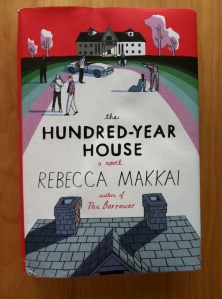 Like Proteus, the mythological figure invoked in one of her character’s poetry, Rebecca Makkai’s The Hundred-Year House* twists and turns, refusing to be confined to any one genre or style. And like Proteus, The Hundred-Year house refuses to tell the future; instead, it charts a way through the past.
Like Proteus, the mythological figure invoked in one of her character’s poetry, Rebecca Makkai’s The Hundred-Year House* twists and turns, refusing to be confined to any one genre or style. And like Proteus, The Hundred-Year house refuses to tell the future; instead, it charts a way through the past.
The story begins — or rather, ends — with Zee and Doug, a married couple who’ve come to live in the carriage house that belongs to Zee’s mother, Gracie and stepfather, Bruce. Zee, a self-professed “Marxist literary scholar” (as a former-ish academic myself, I loved the intradepartmental sniping at Zee’s college), and her mother Gracie are Devohrs, members of a wealthy Canadian family that built an estate called Laurelfield near Chicago, one hundred years before Zee and Doug’s arrival. One of the Devohrs, Violet, is said to be a ghost who still haunts Laurelfield; a huge oil portrait of Zee’s great-grandmother still hangs in the house.
For about thirty years, Laurelfield was an art colony, and it just so happens that one of its major residents was the poet Edwin Parfitt, the subject of Doug’s research. Doug hopes that access to Laurelfield’s records will force him to finish his book, so that he can get a teaching job, instead of surreptitiously ghost-writing a series for middle-school girls. But there’s a catch or two: Gracie’s none too keen on allowing Doug to kick up dust in the attic, and Bruce’s son and daughter-in-law arrive and upend Zee and Doug’s attempted domestic bliss.
More than enough material for a novel there, right? Yet Ms. Makkai gives us more: another section follows giving us scenes from Laurelfield in 1955; then another section about the arts colony in 1929; and a brief prologue set in 1900. Each section is written in a different style, and reveals a bit more of the Laurelfield puzzle, which is so tantalizing that I won’t say anything more about it.
Ms. Makkai’s writing is lively, engaging, and crisp, and her pacing is sublime. As I read The Hundred-Year House, I was caught between the impulse to keep turning pages, impatient to learn more of Laurelfield’s secrets, and the inclination to pause over each page, to note a particularly well-crafted sentence or a telling detail. It’s a marvelous novel, and highly recommended.
Tomorrow: An interview with Rebecca Makkai, author of The Hundred-Year House.
*I received a copy of this book from the publisher for review purposes, which did not affect the content of my review.
Another great review of a book I definitely want to read. I love a book that captures my attention for its plot and characters as well as brilliant writing. Too many books. Too little time.
Story of my life. I have fifteen books still waiting for reviews right now!
I’m so glad you liked this one. I’ve been very curious about it. I read that it is NOT a ghost story, right? It definitely sounds unique.
Not a ghost story, though this book was so good that I’d read a ghost story if Rebecca Makkai wrote one!
Hundred year old houses just have so much potential for good stories, don’t they? I really do wish walls could talk. I know I will love this one!
It’s awesome! I think you’ll love it too.
I loved her first book, and am super excited about this one. Old houses and weird families are such a winning combination when done well. (Even when they’re not done well they’re often entertaining, but I have faith in Makkai’s writing.) I’ve flipped through the pages at my bookstore, and the unique set-up caught my attention. Your review and interview make me want to read it asap.
Thank you! Can I ask which bookstore you work at? I’m Boston-based so I’ve been to lots in Massachusetts, but I’m always looking for a new indie store!
I work at the Concord Bookshop. It’s quite a wonderful place, if I may say so myself. Please say hi if you do stop in.
Pingback: Recommended Reading: Music for Wartime, by Rebecca Makkai | Rosemary and Reading Glasses